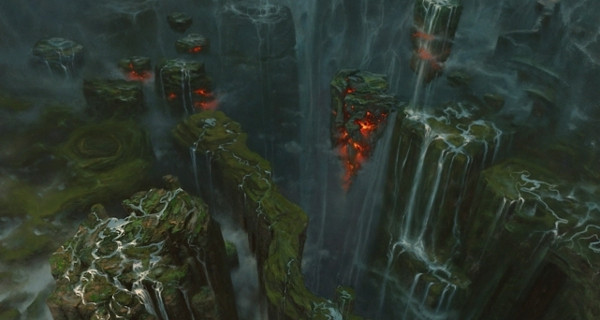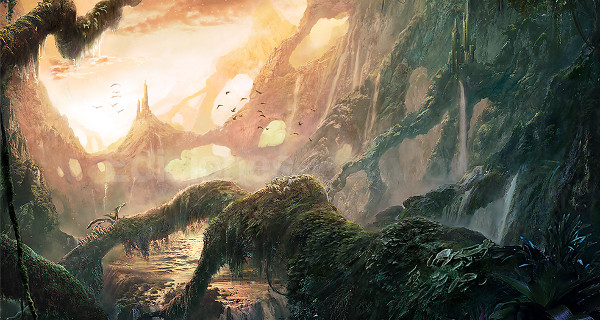THE NEXT SORCERER - AS I WOULD LIKE IT
There are many players and DMs alike that find that the two concepts are too similar to be separated. They view Warlocks as Wizards who delve into dark powers and have spells themed accordingly, and Sorcerers as Wizards that receive their spells from bloodlines and have spells themed accordingly. I think they are legitimate points of view, but they come from a tradition that didn't have clear ideas on the different archetypes in a first place.
Classes need many things to be "worth being a class". They must represent clear and broad archetypes. Any substantial overlapping with another, more iconic class, would make them unnecessary and better off as sub-classes or equivalent.
This time I will limit myself to the Sorcerer, describing in a brainstorm fashion all the concepts that I think can really distinguish and characterize the class, other than rendering it interesting in play and desirable.
Fluff-story.
- Raw magic: what should really make "sorcery" different from "wizardry" is that the Sorcerer should draw from raw magic. Either in its "chaotic form" or its "elemental form", Sorcerer's magic should be to Wizardry what stone and wood are to buildings. It's more primitive, and it ties directly to the forces used by primordials to shape the world as we know it. It's tied to chaos, raw energy and the elements.
- Two fundamental types: as I said, I basically view two types of Sorcerers. One is more tied to the chaotic part of this raw magic, the other more to the elemental nature of it. Note that I view these as the foundations of everything in the world. Chaotic magic is like the "residual radiation left by world's creation", the "wave-like" part of it, while Elemental magic is what constitutes matter at a fundamental level.
- Chaotic Sorcerers. These are more similar to the classic concept of Sorcerers we're accustomed to. Chaotic magic is something invisible to all but them and creatures imbued with raw magic, as certain fey, dragons, demons or others. It's like a stream that encircles all things, and Chaotic Sorcerers can bend it to their will. They can produce many subtle effects with it, and its signature is being a quick and "reactive" type of magic. Each movement, spell, everything in the physical and not-physical world is in some way touched by Chaos, and as such Chaotic Sorcerers can literally mess with it with their own wills, if they're quick enough to do so. Their method is drawing from these energies, collecting them in ways only them can, and then using them in the most varied ways, sometimes in the blink of an eye.
- Elementalists. They are somewhat derived from Chaotic Sorcerers, a more specialized form. While Chaotic Sorcerers mostly have just an inner spark of power inside them that lets them see and manipulate a hidden energy source present in all things, Elementalists have some of this energy directly inside their bodies. For them, it's not a matter of manipulating something outside of them through a special power. They are the special power, and they manipulate forces that come from an inextinguishable wellspring placed directly inside their bodies, in their primitive "animus". As such, they need strong bodies, able to withstand the incredible forces encased within them. They also use will-power, but don't need to understand anything of the world around them, they have raw magic all inside them. They can shape this energy in a lot of ways, their spells wouldn't be limited in form, they wouldn't be "known spells". They could create a fireball in a thousand different ways, it's not the Fireball that wizards cast from the books, although it could resemble it. Their fireball could be proportionally as strong, fast, or big as their muscles, casting movements, or bodies are... Their bodies are magic, their metabolism includes spellcasting (or better yet "spell-morphing") as a biological function.
- Bloodlines. This traditional concept of the Sorcerer is, in my opinion, better off as part of the fluff, story and background. It can be made optionally as a mechanical element, but I think it's something that too many different classes could draw upon, to just make it a foundation of the sorcerer only.
Sorcerers do have innate powers either as inner magical "sparks" and "senses" (Chaotic) or as true elemental power in their bodies, but the reasons are better left open for the player to describe them. Elementalist could have their powers derived from Dragons, and this could show in any spell they create, but it's only a possibility. They could tap into this bloodline to actually have mechanical advantages/differences, but it should be an option, not the rule. Making it a rule is like limiting the broader scope of the class. Even with countless bloodlines, making them something you have to think about for playing a sorcerer is limiting. You should play it for having innate powers to access raw magic and morph into spells, the reasons behind this, the origin of this power, is better left to the player's imagination first. Then it can always be worked into feats, optional class features and anything else.
- Actual possible different origins. To show that bloodlines should not be the only distinguishing origin of Sorcerers, I think the developers should come up with different ideas for the origins of Sorcery in a character. Elementalists could be made when not born, for example, in the superhero fashion. They could have had some episode in their life that tied them to elemental magic, they could have found an incredibly old artifact of the time of the primordials that imbued them with elemental magic, or they could have been subjects of arcane experiments. Maybe they started off as wizards and delved too deeply and strangely into the study of elementalism that they accidentally unlocked powers inside them.
Chaos sorcery could have even more varied origins. It could be a trait that manifests on children born in strange conditions, it could be the result of a close encounter with some strange creature (without the pact thing of warlocks), or it could manifest after birth, for any reason. It's chaos, it's unpredictable.















0 comments:
Post a Comment